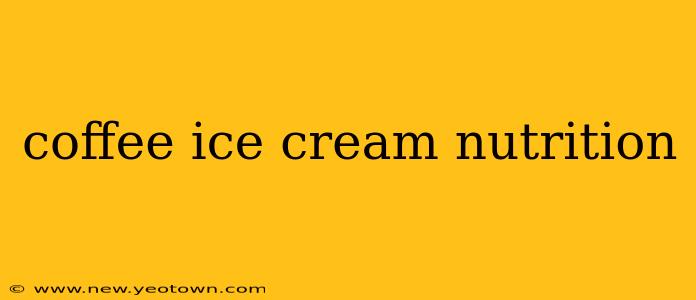Ah, coffee ice cream. That rich, creamy, slightly bitter-sweet indulgence that perfectly captures the essence of a cozy café, even on a scorching summer day. But before you dive headfirst into another scoop (or two!), let's take a closer look at the nutritional profile of this beloved frozen dessert. It's a delicious treat, but understanding its nutritional content helps you enjoy it mindfully.
What are the typical nutritional values in a serving of coffee ice cream?
The nutritional content of coffee ice cream can vary significantly depending on the brand, recipe, and serving size. However, a typical half-cup serving (approximately 100-120 grams) often contains roughly:
- Calories: 200-250 calories. This can fluctuate based on added ingredients like chocolate chips or other mix-ins.
- Fat: 10-15 grams, with a portion being saturated fat. The fat content contributes significantly to the creamy texture.
- Sugar: 15-25 grams. Added sugars are often the primary source of sweetness in many commercially produced brands.
- Protein: 2-4 grams. Protein content is generally low in ice cream.
- Carbohydrates: 20-30 grams. The carbohydrates primarily come from the sugar and milk solids.
It's crucial to remember that these are estimates, and always check the nutrition label of the specific brand you're consuming for accurate information.
Is coffee ice cream high in sugar?
Yes, many commercially produced coffee ice cream brands are relatively high in sugar. The added sugar contributes to the sweetness and overall taste profile. However, the sugar content can vary greatly. Some brands are starting to focus on reducing added sugars, offering healthier alternatives. Homemade coffee ice cream allows for greater control over the sugar content, enabling you to reduce it significantly or use natural sweeteners like maple syrup or honey.
Does coffee ice cream have caffeine?
Yes, coffee ice cream typically contains caffeine, albeit in a smaller amount than a regular cup of coffee. The caffeine content depends on the amount of coffee extract or brewed coffee used in the recipe. For those sensitive to caffeine, it's wise to be mindful of the serving size, especially later in the day.
How many calories are in a scoop of coffee ice cream?
The calorie count per scoop varies based on the size of the scoop and the brand of ice cream. A typical scoop (around ½ cup) usually contains between 200-250 calories, as mentioned earlier. However, larger scoops will naturally contain more calories.
Is coffee ice cream healthy?
This is a complex question without a simple yes or no answer. Coffee ice cream, in moderation, can be part of a balanced diet, particularly if you choose brands with lower sugar and fat content. However, it's important to remember that it's a dessert and should be consumed sparingly. Focusing on portion control is key to enjoying it without negatively impacting your overall health goals. Opting for homemade versions allows you to carefully control ingredients and potentially reduce the amount of added sugar and unhealthy fats.
What are the benefits of coffee ice cream?
While not a health food, coffee ice cream does offer some potential benefits:
- Antioxidants: Coffee beans contain antioxidants which may have beneficial effects on health. However, it's important to note that the amount of antioxidants retained in the ice cream during processing might be significantly reduced.
- Mood boost: The caffeine in coffee ice cream can provide a mild mood lift and increase alertness. This effect is relatively minor compared to a cup of coffee.
Ultimately, coffee ice cream is a delightful treat best enjoyed occasionally as part of a well-balanced diet. Paying attention to serving sizes and ingredient lists can help you make informed choices that suit your individual health goals. Remember, moderation is key!

